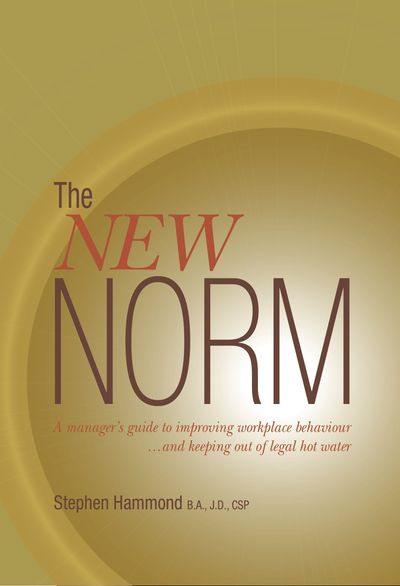Chapter twenty three
THE NEW NORM knows that language is a great uniter and a great divider
Many years ago I was on a small motorbike, touring around one of the Greek islands, when I got lost. Trying to get back on track to my destination, I stopped at the gate of a rural home to ask directions.
An old guy who looked like a character from Zorba the Greek came up to the fence with a big smile and greetings. Unfortunately, he spoke no English and I spoke no Greek (okay, perhaps three words). Yet somehow we discovered that we had just enough French between us to communicate.
At the time, I thought that was pretty cool. It taught me the importance of speaking another language, or as many as you can. (I still struggle to maintain a bit of French.) Language is communication, and therefore a great uniter. It brings people together. However, I’ve also figured out that language can be a great divider.
In late December, 2015, there was a lot of news coverage in Canada about Andreas Kargut filing a B.C. Human Rights complaint against his condominium strata council for conducting a strata meeting entirely in Mandarin. Canadian human rights cases involving language are rare because “language” as a protected human rights ground is very limited.
People might feel it’s a human rights issue, but usually it’s not. And since “language” on its own is not a stand-alone protected ground in B.C., who knows how this case will go? But even if Mr. Kargut is unsuccessful, his issue is something that really “bugs” us.
Canadians believe that when you come to this country, you should learn one of the official languages: French in Quebec and English in the rest of Canada (with New Brunswick being bilingual). But to non-native speakers, English and French are tough languages to learn.
Despite that, most non-English-speaking or non-French-speaking immigrants to Canada tend to learn one or both of the languages over time. Children pick up a new language relatively quickly; adults struggle but eventually become fluent; and seniors, for the most part, don’t pick up much, as they are able to rely on families or same-language communities to get by.

Andreas Kargut
Whenever the issue of language comes up in a workshop, I ask people, “Who likes to travel?” Most people put up their hands. Then I ask, “After the travel, who likes to come home?” Virtually everyone puts up their hand.
Speaking your original language is very much like “coming home.” You don’t have to think. You don’t have to conjugate verbs, worry about using the wrong word or feel self-conscious (as most adults do) about your ability or accent. You just get to be yourself.
For more information about Canada’s changing demographics and the impact that is having on issues of workplace harassment, discrimination, and accommodations, you might want to take my Respectful Workplace online course.
Therefore, when people revert to their first language, even in a work environment, people don’t mean to be rude; they’re often just taking a break…“going home,” so to speak. But others often interpret it as rude, or fear that “they’re talking about me,” as if other people have nothing better to do than talk about us. It’s a very emotional issue and I understand it.
I think it makes complete sense, and workplaces are completely within their rights to make English or French their operational working language – meaning employers have every right to require employees to be fluent in English or French and carry on business in that language.
Of course, if you’re looking for good people with good skills for whom English or French is a second language, and they aren’t initially 100 percent proficient or they have a strong accent, then give them some slack and consider helping them with their language.
I suggest managers avoid being rigid, because that is the kind of behaviour that can prompt banner headlines…the kind you don’t want. I suppose employers can demand that all employees speak English or French during coffee and lunch breaks, but I don’t encourage such a policy.
The OLD NORM
- believes if you come to this country, you should know English or French.
- thinks if you don’t know the language, you should learn it in no time flat, with little room for slip-ups.
- believes you should never speak your first (or second) language at work, in case you’re saying something about him.
- has no desire to learn a few words in the first language of some of her colleagues.
The NEW NORM
- wants people to know English or French, but is patient with those learning it as a new language.
- doesn’t freak out when a colleague speaks another language while on coffee break or other personal time.
- when there is an issue involving language, will speak about it respectfully, trying to stay away from emotional triggers.
- takes pride in learning a few key words in the first language of some of his colleagues.
Suggestions for the New Norm:
01
Be rational. Decide the proficiency of the language needed at work and when it must be spoken. Also, decide when it’s not a deal-breaker. You might or might not care about breaks and personal time, but don’t be rigid for rigidity’s sake. Give serious and rational thought to this ahead of time, before emotions take over.
02
Give thought to what’s “rude.” If people think it’s rude to speak another language, perhaps because it leaves others out at break time, consider what’s happening with smart phones and other devices. Today, many people are found glued to their so-called smart devices, avoiding virtually all contact with other colleagues at work. If you want to put a stop to “rude” break-time behaviours, consider speaking up about other behaviours…or just chalk it up to “personal time.” You decide.
03
Talk it over. Sure some people feel others are excluding them when conversations go on in another language, but encourage them not to jump to conclusions. Have employees on all sides speak their mind – respectfully – so everyone knows where each other is coming from. It’s unlikely that one side is right and one is wrong. Most people want to be respectful at work and get along, so let people talk it over.
This chapter lets you know that people can let their emotions get away from them when speaking about something as simple as language. For another example where people don’t always change with the times, to deal with family status, consider reading
Chapter 15: The New Norm helps employees work with difficult family responsibilities.
Purchase a copy of The New Norm, or if you think all your supervisors and managers, could learn many valuable lessons about creating a respectful workplace, free of harassment, bullying and discrimination, you can get volume discounts.
What one reader has to say about Stephen’s book, The New Norm
“When I got up early this morning and headed for my computer here at home, I told myself, ‘Just skim read a few sections of Stephen’s book and get a note back to him.’ I couldn’t do that, Stephen. I read it all – every word. You have taken too long to write this book – Employees and Employers in Canada need to read this.
Stephen will capture your attention in highlighting up to date and interesting headlines which we all have an opportunity to learn from. If you believe you can simply skim read this book, think again! The mesmerizing case studies will leave you yearning to learn the conclusion as any great author should do for their readers. Sincere attention to the messages here can only result in best practices within Canadian workplaces.”
Melinda Heidsma
Executive Director, AiMHi, Prince George Association for Community Living

Respectful Workplace Online Training Course
If you, your employees or your managers want more information,
sign up for my new online training course:
The Respectful Workplace in Canada.
With 10 modules of useful, relevant and current information,
this course can help everyone at your workplace.
This may be the best online harassment training your people will get.
Stephen Hammond is a lawyer turned speaker and consultant in the field of harassment, sexual harassment, bullying and discrimination at work.
The New Norm is Stephen’s third book.
Here’s more information about Stephen.



